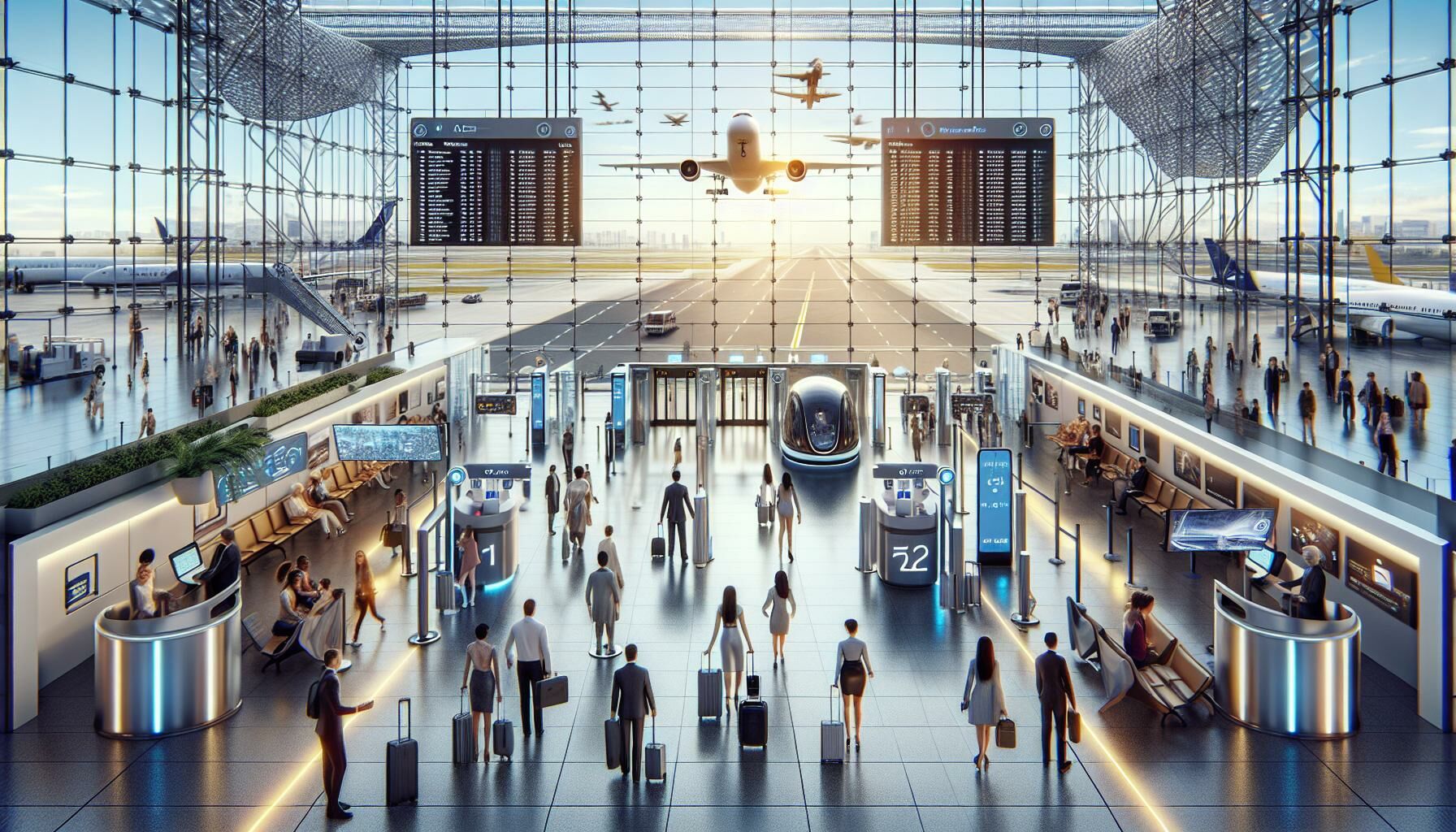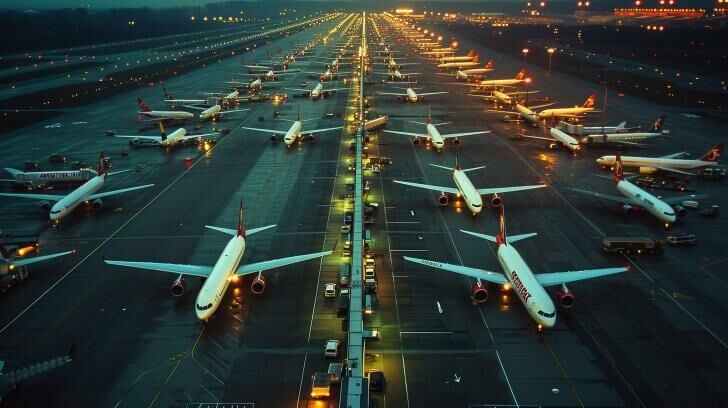How airlines are revolutionising flight management with cutting-edge AI technology

In today’s world where efficiency and timeliness are paramount, airlines are increasingly adopting advanced technology to maintain their competitive edge. A major airline near Luton Airport has integrated AI to revolutionize its flight management processes. The airline’s new control centre utilizes a generative AI tool named Jetstream, which is designed to streamline operations and address issues for pilots and crews efficiently.
With over 250 employees managing approximately 2,000 flights daily, the integration of AI is transformative. Jetstream forecasts standby crew requirements and recommends optimal crew options, ensuring seamless and punctual operations. This state-of-the-art facility not only enhances operational efficiency but also fosters a conducive working environment featuring natural light and minimal noise, illustrating how technology can improve both performance and workplace well-being.
Role of AI in airline flight management
Predicting flight delays
AI significantly enhances flight delay predictions. Advanced algorithms analyze extensive datasets, including weather patterns, air traffic control updates, and operational schedules, enabling airlines to predict delays more accurately. This improves passenger communication and allows for timely service adjustments.
For instance, major airlines employ AI tools that incorporate real-time data feeds to predict potential disruptions before they impact flight schedules. Predictive analytics assess risk factors such as maintenance issues and crew availability, thereby reducing unexpected delays. This proactive approach results in better resource allocation and increased customer satisfaction.
Optimizing fuel management and costs
AI is highly efficient in optimizing fuel consumption, crucial for cost savings and minimizing environmental impact. By analyzing flight routes, weather conditions, and aircraft performance, AI identifies the most efficient flight paths and optimal altitudes.
AI-powered tools continuously update flight plans based on real-time data, ensuring minimal fuel use. Adjustments are made during flights to accommodate changing conditions, enhancing efficiency. For example, algorithms suggest optimal times for altitude changes to avoid turbulence, resulting in substantial cost savings and reduced emissions.
Moreover, AI monitors aircraft performance and maintenance needs, predicting and preventing issues that could lead to inefficient fuel consumption. This comprehensive approach ensures each flight operates at maximum efficiency, both financially and environmentally.
AI-Enhanced customer experience

Personalized booking and check-in processes
AI tools enhance booking and check-in processes by analyzing customer preferences and travel data, offering more tailored flight options and offers. Frequent flyers, for example, might receive suggestions based on their regular seat preferences. AI also streamlines check-in processes with self-check-in kiosks and mobile apps, providing a user-friendly experience and reducing wait times.
Real-time updates and communication
AI enhances real-time communication with passengers. Airlines use AI to send instant updates on flight status, gate changes, and delays via SMS or mobile notifications, keeping passengers well-informed. In case of delays, AI systems provide quick rebooking options or compensation. AI-driven chatbots also manage customer queries efficiently, reducing the demand for human intervention.
By incorporating AI into these processes, airlines significantly improve the overall travel experience for passengers.
Challenges and ethical considerations
Data privacy concerns
AI systems in airlines depend on vast amounts of passenger data, including personal information such as names, travel habits, and payment details. Although AI personalizes experiences and enhances efficiency, it raises significant data privacy concerns. Airlines must implement robust security measures to protect this information from cyber-attacks, as data breaches may compromise passenger privacy.
Regulations like GDPR in Europe require strict data handling protocols. Airlines must ensure compliance to avoid hefty fines. Transparency in data usage is crucial; passengers need to understand how their data is used and have the option to opt-out. Educating customers on data protection measures builds trust and alleviates privacy concerns.
AI decision-making transparency
AI-driven decisions impact many aspects of airline operations, including flight scheduling, fare setting, and customer interactions. However, the complexity of AI algorithms can obscure the decision-making process, leading to mistrust among passengers and regulatory bodies.
Airlines need to clarify AI decisions. Providing insights into how algorithms operate and the data they use can demystify the process. Transparency ensures accountability and fosters trust. Airlines should regularly audit and review AI systems to ensure fairness and accuracy, addressing biases in AI algorithms to ensure equitable treatment for all passengers.
Prospects of AI in aviation

Advances in technology
AI technology continues to transform the aviation industry. Predictive maintenance is a significant advancement, where AI systems analyze real-time data from aircraft components to identify potential issues before they result in costly repairs or delays, enhancing safety and reducing operational costs.
Improved weather prediction models powered by AI have also emerged. These models process large datasets from meteorological sensors and historical data for accurate weather forecasts. Better forecasting enables airlines to optimize flight paths, avoid severe weather, and enhance fuel efficiency.
AI-driven automation technologies streamline operational processes. For instance, AI algorithms optimize crew scheduling, considering factors such as crew availability, legal restrictions, and operational status, minimizing delays and ensuring compliance with aviation regulations.
Potential for expansion and adoption
The potential for AI adoption in aviation is vast. Airlines are exploring AI integration in air traffic management. AI systems analyze airspace data, dynamically managing flight traffic, reducing congestion, enhancing efficiency, and ensuring safety in increasingly crowded skies.
Airlines could also adopt AI to further personalize customer experiences. Advanced machine learning models analyze passenger behaviour and preferences, delivering tailored services and offers, which improve customer satisfaction and loyalty.
AI assists regulatory bodies in ensuring compliance by analyzing operational data to detect patterns indicating non-compliance with aviation safety standards, enabling proactive regulatory measures and enhancing safety and reliability.
AI applications in baggage handling systems aim to reduce misplaced or delayed luggage incidents. AI-powered systems track baggage in real time, providing passengers with current information and improving the travel experience.
Overall, AI’s future in aviation appears promising. As technology evolves, its applications will likely become even more integral to airline operations, enhancing efficiency, safety, and customer satisfaction.
Latest Thailand News
Follow The Thaiger on Google News:


























